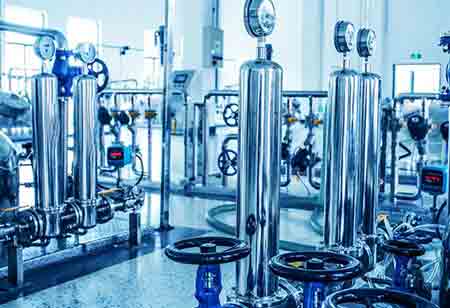Thank you for Subscribing to Chemical Industry Review Weekly Brief
Supply Chain in Chemical Industry

Thank you for Subscribing to Chemical Industry Review Weekly Brief

By
Chemical Industry Review | Monday, May 23, 2022
Stay ahead of the industry with exclusive feature stories on the top companies, expert insights and the latest news delivered straight to your inbox. Subscribe today.
Supply Chain Management incorporates supply and demand management within and throughout companies.
FREMONT, CA: Understand the key factors influencing the chemical industry's supply chain and strategies to overcome the current challenges. Supply Chain Management encircles the planning and management of every activity in sourcing and procurement, conversion, and all Logistics Management actions. It also incorporates coordination and collaboration with channel partners, suppliers, intermediaries, third-party service providers, and customers. Essentially, Supply Chain Management incorporates supply and demand management within and throughout companies.
What is the significance of Supply Chain Management for the Chemicals Industry?
Made up of numerous smaller industries, along with bulk, specialty, and polymers, the chemicals industry covers hundreds of segments. Hence, many raw materials are necessary to produce industrial chemicals that supply other sectors and customers. Supply chain and logistics are important to chemicals companies' success as they depict a high share of cost and are important for service level and top-line results. Supply chain costs depict an average of 8-10% of sales revenue for chemical companies. This reflects the comparatively low value per ton of chemical products and the relatively high costs of moving and storing them, provided their bulky and dangerous nature.
Why do Chemical Industries require to focus on Supply Chain?
The Chemicals industry is also special in supplying virtually every other economic sector with essential materials. The competitiveness of all these other sectors partly depends on the efficient supply of chemical products. For this reason, the chemical industry has been explained as the 'anchor' of a modern economy. Faced with global competition and global customers, more and more complex operations, and rising logistics costs, a growing number of chemical companies are concentrating on the supply chain to balance expenses & service levels and impel flexibility and sustainability.
The prominence of Logistics in the Chemicals Supply Chain:
Logistics are a main aspect of the chemical industry as production and intake locations are mostly separated. Efficient, competitive, and sustainable logistics are therefore important for its future development. For instance, it is regular for explosive, toxic, and dangerous materials to be transported with the supply chain. Great care must be taken to guarantee safety and security during transportation. Chemical transportation must be cautiously planned and managed at all stages, from the production facility to the end user. Companies are required to consider the type of containers utilized for carrying the chemicals and whether they will move by truck, train, or boat; the associations that will have access to the materials during consignment; and how they can get real-time details about the location and status of the materials, to minimize risk. Logistics management for the chemicals industry requires continuous operational safety and security improvement. Supply chain security and risk handling will be key logistics areas to prevent disruptions from major transport accidents, theft, labor issues, and terrorist threats.
Unremitting safety and security standards progress will be highly important for chemical companies. This will need close cooperation with logistics service providers and joint advancement programs. Strict selection and continuous monitoring of logistics service providers' performance will be required.
Impact of Regulations on Supply Chain:
Chemical companies must adhere to strict regulations and restrict the chance of spoilage, accidents, or spills. Security measures must ensure that hazardous chemicals do not fall into the false hands. There is an ever-growing emphasis on emission reduction, safety, and security from the general public and politicians, causing increased regulation on emission reduction and improved safety and security standards. Competitive pressure to reduce costs and environmental pressure to handle resources more sustainably raise the significance of the supply chain. Finding the maximum balance between cost, responsiveness, and sustainability is the recipe for advancing logistics solutions.
Influences of Globalization on Chemicals Industry Logistics:
Globalization has followed in increased supply chain complexity for the chemicals sector. There has been a major increase in imports from Middle East Countries, resulting in improved supply chain intricacy for chemical producers in logistics management, planning, and coordination. This is heightened by a priority on working capital reduction, causing* lower inventory levels and ultimately demanding further supply chain flexibility. The production shift has led to a change in the global trade balance and has an impact on lengthening the supply chain from suppliers via producers to customers. This results in a change in logistic flows and longer lead times for inbound materials.
Supply Chain Assets:
Chemical companies manage supply chain assets used for transportation, including drums, cylinders, rail cars, bulk containers, and tanks. They must ensure sufficient assets at each plant, distribution center, warehouse, and port to maintain day-to-day operations and fulfill customer delivery promises. To achieve this, many industry players own private fleets and distribution centers depending on manufacturing locations and distance from the demand for the end products. Chemical companies should consider the full business value chain and obtain a clear view of how the operational components of an organization are currently configured and function together to execute the business strategy. It should provide an end-to-end view across the significant elements of operational activity.
Use of Technology:
Logistics models have evolved to address the market's changing needs and vary based on the scope of service offering and degree of collaboration across the supply chain. The move towards integration ran slower in the chemical industry compared to others, e.g., automotive. Rapid advances in supply chain technology enable increased functionality across multiple sites and countries and a greater potential to improve the performance of supply chains (e.g., IT enabling real-time tracking & tracing and supply chain visibility, complex multi-echelon planning tools, cloud computing). The chemicals industry needs to use integrated planning systems to improve logistics asset productivity and network reliability.
I agree We use cookies on this website to enhance your user experience. By clicking any link on this page you are giving your consent for us to set cookies. More info

However, if you would like to share the information in this article, you may use the link below:
https://www.chemicalindustryrevieweurope.com/news/supply-chain-in-chemical-industry-nwid-67.html



